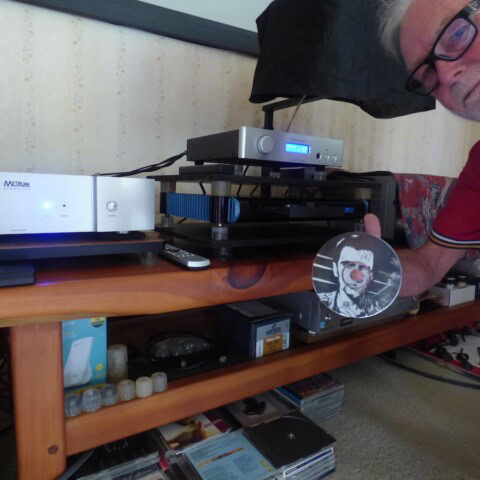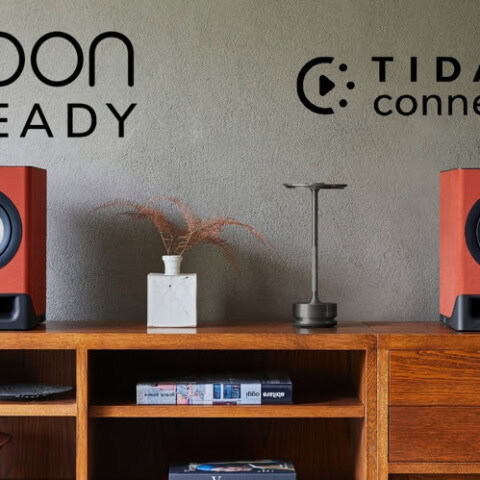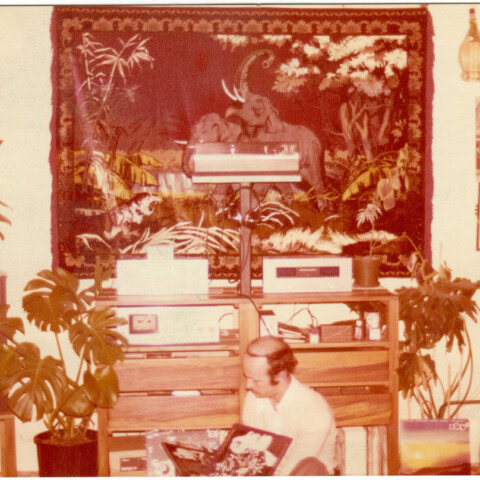DAC-V1 $3000/NAP 100 $1900
5 Stars
Naim gets bounteous bass and warmth in spades on two matching, generously priced products that may just make Kramer’s products-of-the-year list.
FEW AUDIOPHILES WOULD argue that Naim Audio is one of the most iconic of hi-fi brands. The company’s products are instantly recognisable, and for a long time, the Naim signature sound was just as easily identifiable, not to mention polarising. For every music lover who had a big thing for the Naim sound, there were a few who found it to be a little intense, particularly when contrasted with the warmer and richer sound commonly found emanating from some of the other British brands.
Besides that sonic signature, Naim also had design eccentricities that turned off some punters – the insistence on using DIN interconnects for example, or the theory that only Naim’s speaker cable was any good in a Naim system.
 All those issues have become less of a big deal over the years, especially on the lower end products, where the sound has become a tad warmer, RCA sockets have become commonplace, and basically, the products have ended up becoming more approachable. This was immediately obvious with the Nait 5i integrated amplifier, which opened up the Naim brand to a whole new segment of customers, while maintaining most all of the key values that the brand has built over the years.
All those issues have become less of a big deal over the years, especially on the lower end products, where the sound has become a tad warmer, RCA sockets have become commonplace, and basically, the products have ended up becoming more approachable. This was immediately obvious with the Nait 5i integrated amplifier, which opened up the Naim brand to a whole new segment of customers, while maintaining most all of the key values that the brand has built over the years.
The DAC-V1 and the matching NAP100 power amp aim to continue this “opening-up” process by offering a blend of traditional Naim elements with easy to access features that’ll appeal to a wide range of buyers. Together they form the basis of a compact digital hi-fi system – all you really need to add is a set of speakers and some speaker cable, and you’re away.
Features & Construction
The DAC-V1 is described by Naim as “an asynchronous USB digital to analogue converter with multiple digital S/PDIF inputs, precision volume control and a high-quality headphone amplifier”.
That pretty much covers the DAC-V1’s remit but it’s worth noting that it’s also very much designed to be a preamplifier to that NAP 100. At only 87 x 207 x 314mm (H x W x D), the DAC-V1 is a compact little thing – the power amp matches those dimensions to the millimetre, which means they’d comfortably fit onto one shelf of an audio rack. Ideally, the two units could just slot onto a shelf or table, where they’d look great. I’ve always had a thing for Naim’s restrained industrial design, and while I prefer the look of the full-width products, the compact ones are still striking when the green logos are illuminated.
The DAC-V1 boasts five S/PDIF digital inputs (1 coaxial BNC, 2 coaxial RCA, 2 optical TOSLINK), along with the Asynchronous USB input. In addition, there’s a 6.35mm headphone jack connected to a high-quality headphone stage (more on this later). There’s a set of RCA analogue outputs, plus the obligatory DIN connector that’s so much a part of Naim’s history – these outputs can be set as variable or fixed to ensure that the DAC-V1 can integrate into systems using other manufacturer’s power amps.
The NAP 100 is a 50-watt per channel into 8 Ohms dual-mono design (75 watts at 4 Ohms). It’s based on the circuit topology found in Naim’s SuperUniti all-in-one player and like most power amps, it’s a simple enough thing – you get DIN and RCA inputs, speaker outputs, a power switch, and that’s your lot.
Sound Quality
The Naim pair were hooked up to each other using the supplied DIN interconnect, with a pair of Theophany M5 Series 2 floorstanders connected to the NAP 100 using a 2m run of Slinkylinks silver speaker cable. The first source I tried was my Marantz SA8260 SACD player, connected to the DAC-V1 with a QED optical cable.
I just hit play on the CD that happened to be in the 8260’s drive and settled in to listen – the CD turned out to be disc one of O.A.R’s Rain Or Shine four-CD set, so track one was ‘About Mr Brown’, a typically upbeat O.A.R song. The first thing I noticed was just how clear the sound was, but then I noticed the looming presence of the bass. I’ve had dozens of amplifiers running these speakers since 2007 but I’ve never heard them sound quite so fulsome down below.
I quickly popped in Massive Attack’s Blue Lines and cued up ‘Five Man Army’ to see just how deep the Theophany’s were going. Again, they seemed to have found new life in the very lowest part of their frequency range, but interestingly enough, the extra bass weight wasn’t being delivered at the expense of any other low frequency characteristics. There was no looseness or booming, just deeper bass than normal, presented with that foot tapping verve that’s expected from Naim amplification. I laboriously switched back to my Sachem pre/power amps and after a bit of fiddling around with a frequency generator, I was left in no doubt that I wasn’t hallucinating. Some combination of system synergies, possibly related to the NAP 100’s damping factor was pushing the bass of the big floorstanders to sound simply superb, especially considering that we’re talking about a $1900 power amp here.
 Switching back to the Naim gear and running through other discs from my collection, it also became obvious that the aforementioned clarity was there in abundance – especially through the midrange, but also into the treble region. With all that bass on hand, there’s a definite warmth to the sound right through to the upper mids, but the NAP 100 is also an exceedingly smooth and inviting listen, much more so than I can recall hearing from Naim amps – my speakers lean marginally towards a warm sound but the majority of what I was hearing was courtesy of the DAC-V1 and the NAP 100. The sound turned out to be nicely balanced and well suited to a wide variety of genres – this pair is as happy quietly spinning something as delicate as Alison Krauss and Union Station as it is driving Pearl Jam at high levels. There’s a lovely naturalness to the sound here – big, full-bodied and totally non-fatiguing, which bodes well when it comes to speaker matching.
Switching back to the Naim gear and running through other discs from my collection, it also became obvious that the aforementioned clarity was there in abundance – especially through the midrange, but also into the treble region. With all that bass on hand, there’s a definite warmth to the sound right through to the upper mids, but the NAP 100 is also an exceedingly smooth and inviting listen, much more so than I can recall hearing from Naim amps – my speakers lean marginally towards a warm sound but the majority of what I was hearing was courtesy of the DAC-V1 and the NAP 100. The sound turned out to be nicely balanced and well suited to a wide variety of genres – this pair is as happy quietly spinning something as delicate as Alison Krauss and Union Station as it is driving Pearl Jam at high levels. There’s a lovely naturalness to the sound here – big, full-bodied and totally non-fatiguing, which bodes well when it comes to speaker matching.
Don’t for a second imagine that the Naim pair sounds like the common cliché of a valve amp – warm and slow. That’s not the case at all – there’s still a huge amount of the traditional Naim sound in there. It’s fast, relentlessly dynamic, always musical and above all, revealing, but without the intensity, sharpness and edginess once associated with Naim gear.
Something I found particularly appealing was running through compilation and tribute albums with a range of artists contributing very different interpretations of songs, sometimes with wildly varying production values. The Naim pair just delivered the goods every time – feed them a beautiful production and that’s what you get – clear and clean. But play something that’s not all that well recorded and it still sounds good.
There’s no lack of detail here, it’s just that the sound isn’t ultra-forensic or analytical but the resolution is always apparent, all the more so when you switch from CDs to high-res audio, which is where the DAC-V1 really shows off its class.
 Connected to my MacBook Pro via USB, and fed a selection of 24/96 and 24/192 files, the sound quality took a step upwards. Clearer all round, ever so slightly deeper at the bottom and noticeably sweeter through the top end. The DAC-V1 is the best sounding DAC I’ve had at home, which makes sense in a way because at $3K, it’s not exactly a budget unit in the sub $1K range. Then again, it’s also a very capable preamplifier and a superb headphone amp, so much like the NAP 100, it needs to be seen as something of a bargain, especially in the context of how good it sounds when paired up with the nicely-priced power amp. As a stand-alone external DAC, the DAC-V1 is quite the performer. I ran it into my Sachem Pure preamp and was definitely impressed with just how transparent a source it is.
Connected to my MacBook Pro via USB, and fed a selection of 24/96 and 24/192 files, the sound quality took a step upwards. Clearer all round, ever so slightly deeper at the bottom and noticeably sweeter through the top end. The DAC-V1 is the best sounding DAC I’ve had at home, which makes sense in a way because at $3K, it’s not exactly a budget unit in the sub $1K range. Then again, it’s also a very capable preamplifier and a superb headphone amp, so much like the NAP 100, it needs to be seen as something of a bargain, especially in the context of how good it sounds when paired up with the nicely-priced power amp. As a stand-alone external DAC, the DAC-V1 is quite the performer. I ran it into my Sachem Pure preamp and was definitely impressed with just how transparent a source it is.
The only issue I could pick with the NAP 100’s performance is a tendency for the sound to harden up when pushed really loud, particularly at the top – but then again, this is 50-watt power amp, not a faux arc-welder, so it has its absolute limitations in terms of volume levels. Rest assured that I really had to be hammering it for this to become apparent.
Headphones
As mentioned above, the DAC-V1 is designed to function as a high-end headphone amp, and according to the Naim website, the company’s engineers have paid close attention to optimising this element of the unit’s functionality:
“Naim has a long tradition of using discrete transistor, single ended Class-A amplifiers for all its pre-amplifier stages. This has now been extended to the headphone amplifier of the DAC-V1. The headphone amplifier cleverly uses the pre-amp output amplifier for headphone drive. The moment headphones are plugged in, the output current drive is automatically turned up five times to give dynamic drive for all headphone impedances. The amplifier runs from a high voltage power supply so has the ability to drive high impedance headphones with the voltage swing they require for open and dynamic sound. The result is the audio stages are kept as simple and pure as possible for both normal and headphone modes.
Single ended Class-A is long known for its natural sound quality and exhibits zero crossover distortion. Its Achilles’ heel is that it is inefficient, but for headphone drive this is not important so all the benefits can be exploited. Most headphone amplifiers are Class-AB, where the amplifier’s output stage is in two halves, one pushing and one pulling. Here the two halves meet in the middle and can produce non-consonant distortion or distortions that do not occur naturally in music.”
 I ran my well-used set of Sennheiser HD650 ‘phones into the DAC-V1 with my Marantz SA8260 SACD player again connected to one of the optical inputs. It didn’t take long for me to grasp just how superb this headphone stage is – the clarity and detail levels are as good as anything I’ve ever heard from a dedicated headamp, while dynamics are delivered with an authority that needs to be heard. Interestingly enough, the sound quality from the DAC-V1’s headphone stage is much more like the traditional Naim sound I’m used to – slightly lean but oh so fast. You’d need to spend a fair amount of cash to match this headphone stage, but why would you?
I ran my well-used set of Sennheiser HD650 ‘phones into the DAC-V1 with my Marantz SA8260 SACD player again connected to one of the optical inputs. It didn’t take long for me to grasp just how superb this headphone stage is – the clarity and detail levels are as good as anything I’ve ever heard from a dedicated headamp, while dynamics are delivered with an authority that needs to be heard. Interestingly enough, the sound quality from the DAC-V1’s headphone stage is much more like the traditional Naim sound I’m used to – slightly lean but oh so fast. You’d need to spend a fair amount of cash to match this headphone stage, but why would you?
Conclusion
So what we have here is a sub $5K digital hi-fi system that is seriously good in every way that counts. If your music collection is on computer or you’ve got a CD player and want to hear your silver discs sounding great, then the DAC-V1 is a mighty fine way to do just that. And of course, the NAP 100 is the perfect partner. Throw a high-quality set of ‘phones into the mix and the DAC-V1 makes for an even more compelling purchase.
Sure there are probably hundreds of combinations of DAC and amplification that could be put together for the same money but this pair just go so well together that it seems a shame not to give them a serious listen before you start shopping around. They really are that good – and at this early stage of the game, they’re most certainly on the list for my products of the year. ASHLEY KRAMER















